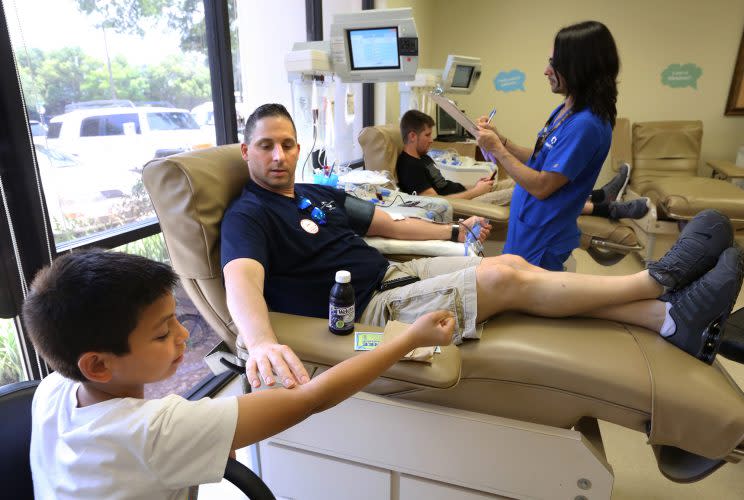Federal ban on gay blood donors causes frustration, confusion among lawmakers

Following the shooting at Pulse nightclub in Orlando on June 12, OneBlood, a local blood bank, put out an urgent call for blood donations.
By 9:56 a.m., OneBlood’s website crashed, and by the end of the day more than 5,300 people had donated blood across the state of Florida.
A minority among the outpouring of donors, however, was gay and bisexual men.
Conflicting reports regarding a temporary lifting of a Food and Drug Administration ban on gay blood donors caused confusion on the day of record-breaking donations.
There was, however, no lift in effect, causing anguish to reverberate in the LGBT community.
The FDA policy in question bars a potential gay blood donor for one year after his last sexual contact with another man. The policy, which debuted in 1985 in response to the AIDS epidemic, previously instituted a lifetime ban for any man who had sexual contact with another man. This policy was updated in December 2015, but lawmakers and activists still feel it is outdated, especially in the wake of a tragedy that directly affected the gay community.
“There were so many gay victims involved with the attack, and so many of their loved ones were moved to step up and help their fellow Americans — but were unable to,” Rep. Jared Polis, D-Colo., told the Daily Beast. “All of the pretenses of this policy are gone — it was never based on science in the first place. One year is a completely arbitrary period, obviously, and straight people are not required to abstain.”
Little was known about AIDS when the policy was written, and as scientists and researchers learn more, a sense of frustration is growing.
“There’s no science that would support the conclusion that there’s something inherently different about the risk profile based on who someone loves,” Polis told CNN.
The Human Rights Campaign echoed Polis’ sentiment, telling CNN in December that the change in the ban was a “step in the right direction” but problematic in its reinforcement of false stigmas.
However, according to a statement recently released by the FDA, “a history of male-to-male sexual contact was associated with a 62-fold increased risk for being HIV positive, whereas the increase in risk for a history of multiple sexual partners of the opposite sex in the last year was 2.3-fold.”
In some bipartisan circles, knowledge of this long-standing ban is somewhat murky.
“What now? I don’t know anything about that. I’ve never heard of that! It’s crazy! It’s the first time I’ve ever heard of that,” Sen. Joe Manchin, D-W.Va., told the Daily Beast last week.
“I don’t know about those topics off [the top of] my head,” Sen. Bob Corker, R-Tenn., added.
Those politicians who are aware of the ban are calling for a swift revision in the wake of the shooting.
Leading the charge is Polis, who is openly gay and a member of the House LGBT Equality Caucus. After the Orlando shooting he took to Twitter to blast the ban, calling it “morally bankrupt.”
“Right now we have the very bizarre and perverse situation that actually endangers our national blood supply, where if somebody happens to be straight but has had unprotected sex with multiple partners of the opposite sex, they’re allowed to donate,” Polis told CNN. “But if somebody is gay and married and in a monogamous relationship they’re actually screened out.”
Polis and two of his colleagues, Reps. Mike Quigley, D-Ill., and Barbara Lee, D-Calif., are planning to send a letter to FDA Commissioner Robert Califf pushing for the ban to be overturned.
In addition, one of their colleagues, Rep. Mike Honda, D-Calif., introduced a bill Thursday that would loosen the ban. While Honda’s measure would not overturn the prohibition outright, it would give the Department of Health and Human Services “increased flexibility” in screening blood donors during emergencies, according to the bill’s text.
“It was a horrific irony that gay and bisexual men could not donate in a time of local need,” Honda said in a statement. “This is not a problem of science; it’s a problem of morality. It’s time for the Secretary to use her authority, while respecting all safety controls, to give our local blood banks resources today so they can respond to the demand of tomorrow.”
The FDA has pushed back on the outcry, saying in a statement after the Orlando shooting that there is no present blood shortage and that it is open to revisiting its policies if new scientific research becomes available.
“At this time there is an adequate supply of blood to meet the need, and the scientific evidence is not available to support an alternative to the current deferral policy,” the FDA’s Tara Goodin told CNBC in a statement. “We empathize with those who might wish to donate, but reiterate that at this time no one who needs blood is doing without it.”

